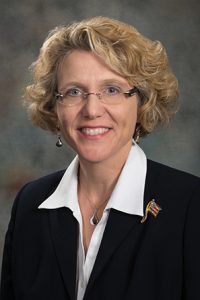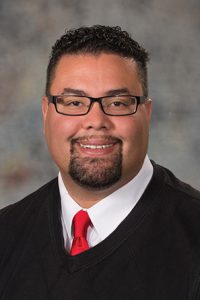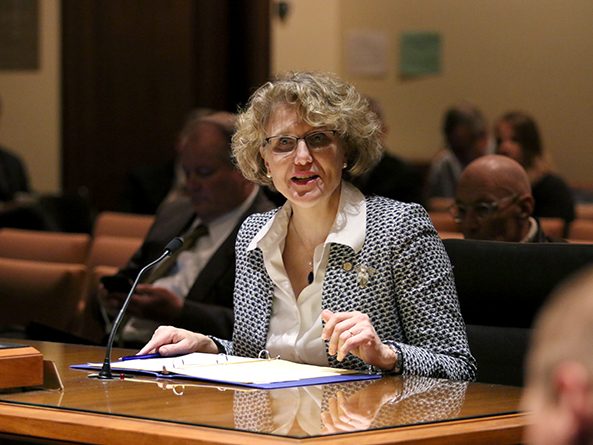Bills would increase taxes on tobacco, cap taxes on cigars
The Revenue Committee heard testimony Feb. 15 on a bill that would raise taxes on cigarettes by $1.50 per pack and another that would limit the tax on cigars.
LB1117, introduced by Sen. Sue Crawford of Bellevue, would increase the tax on a pack of cigarettes from $0.64 to $2.14 and the tax on snuff from $0.44 per ounce to $1 per ounce. The tax on all other tobacco products would increase from 20 percent of the purchase price to 45 percent.
The bill would direct the additional revenue to the state’s general fund and increase an annual transfer to the Nebraska Health Care Cash Fund from $1.25 million to $2.5 million.
The state Department of Revenue estimates that the bill would increase revenue to the general fund by approximately $93.7 million in fiscal year 2018-19 and a further $97.6 million in FY2019-20.
Crawford said the bill would have two main benefits. First, raising the tax would reduce the number of young Nebraskans who start smoking each year, thereby reducing state health care costs from diseases caused by tobacco use. Second, it would generate additional revenue the state could use to offset the current budget shortfall or to replenish the cash reserve if the Legislature chooses to draw from it this session.
“As we enter the second consecutive year of fiscal shortfalls, it is critical that we consider adding additional sources of revenue,” she said. “Raising our tobacco tax rate would provide an important influx to the state’s general fund.”
Fernando Wilson, a faculty member at the UNMC College of Public Health, testified in support of the bill on his own behalf. According to the Centers for Disease Control and Prevention, Wilson said, smoking-related illnesses cause 2,500 deaths among Nebraskans each year, and the state’s health care system incurs approximately $800 million in costs from treating those illnesses annually.
Roger Wiese, director of the North Central District Health Department in O’Neill, also testified in support of the bill. According to the U.S. surgeon general, he said, increasing the price on cigarettes is one of the most effective tobacco control interventions because it is proven to reduce smoking, especially among youth and those with low incomes. If the current tobacco use pattern persists, Wiese said, 38,000 Nebraska children under the age of 18 will ultimately die prematurely from smoking-related illnesses.
“A tobacco price increase simply saves lives,” he said.
Testifying in opposition to the bill was Scott Lautenbaugh, who spoke on behalf of the Nebraska Premium Tobacco Association. He said cigars should not be treated the same as other tobacco products because they do not have the same negative health effects and do not contribute to youth smoking rates.
“Premium cigars are not a gateway for youth smoking,” Lautenbaugh said. “They’re already priced out of the market for kids.”
Sarah Curry, policy director at the Platte Institute, also testified in opposition to the bill, saying that the tax increase would do more harm than good. Revenue from tobacco taxes has fallen 2.1 percent per year over the last decade, she said, making such a revenue source unreliable for funding state operations. It also would affect low income earners the most, she said.
“Research has also found that higher tobacco taxes reduce usage by an insignificant amount and are more likely to increase smuggling and [create] an illegal tobacco market without necessarily improving health outcomes,” Curry said.
Jeff Doll, owner of Safari Cigars and Lounge in Omaha, also testified in opposition. He said 80 percent of his customers also buy cigars from internet sellers because they can save 30 to 50 percent after factoring in state excise and sales taxes, as well as local taxes. Increasing the state tobacco tax only would drive more people to buy online, Doll said.
“You won’t get any more tax [revenue],” he said. “You’ll probably get less tax from the cigar side of it.”
Under LB1087, introduced by Omaha Sen. Justin Wayne, cigars, cheroots and stogies still would be taxed at 20 percent of their purchase price, but the tax would be capped at 50 cents per item. Wayne said the cap would help Nebraska retailers better compete with internet sellers.
“The tax imposed when buying in state has gotten a little out of control,” he said. “It should be capped per unit to encourage purchasing cigars here in Nebraska rather than online.”
The state Department of Revenue estimates that the bill would reduce excise tax revenue by approximately $239,000 in FY2018-19 and a further $335,000 in FY2019-20.
Phil Vanderpool, an Omaha cigar shop owner, testified in support of the bill, saying that it would help him grow his business.
“It’s going to reduce the price of our expensive cigars,” he said, “and hopefully we can get some of our customers that have gone to the internet and mail order houses back into our shops.”
Testifying in opposition to the bill was Matt Prokop of the American Cancer Society Cancer Action Network. He said cigars contain many of the same cancer-causing substances as cigarettes and other tobacco products and are a major cause of throat, oral and esophagus cancers. Eight percent of Nebraska high school students smoke cigars, Prokop added.
“Capping or limiting the cigar tax would ensure that these products stay affordable for youth and further incentivize dangerous and addictive tobacco use by young Nebraskans,” he said.
The committee took no immediate action on either bill.


